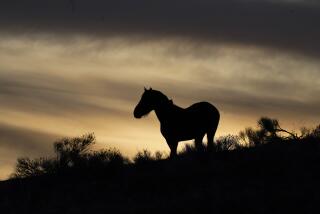Equine virus outbreak spooks horse owners across Western U.S.
The horse named Powered By Pep had just won his class at a competition in Bakersfield when his owner, David Booth, noticed that the animal was not quite himself.
“A little slow-footed,” the 22-year-old Acton rancher recalled Monday.
Booth had Pep’s temperature taken and soon discovered that his 7-year-old bay gelding had fallen victim to a dire outbreak of equine herpes virus-1, a highly contagious airborne virus that has killed or resulted in the euthanizing of at least seven horses this month and sown fear in equine circles across the Western states.
The outbreak started, authorities agree, at an event in Ogden, Utah, between April 18 and May 3, and has spread to nine states, including California, New Mexico, Oregon and Washington. Horse events from Tulsa, Okla., to San Diego County have been canceled because of the scare. Colorado, which has reported 22 suspected cases and two euthanizings, is requiring health certifications for horses crossing its border.
In California, the Department of Food and Agriculture reported one new case of EHV-1 on Monday. That brought the state’s total to 18, including Pep in Acton and another horse in Ventura County.
Seven of the horses displayed the more severe neurological signs, including one whose condition grew so grave that he had to be put down, authorities said. The 17 survivors are under a state-ordered quarantine and are being treated by private veterinarians, said Steve Lyle, public affairs director at the state Department of Food and Agriculture.
Lyle said the department is not ordering or recommending that horse events in the state be cancelled, although “that could change at some point.”
“It certainly is the worst outbreak we’ve seen in a number of years,” Lyle said.
EHV-1 is a particularly virulent strain of equine herpes that has surged since 2000. In its other forms equine herpes can cause respiratory symptoms, spontaneous abortions in mares and neonatal death. EHV-1 is the neurological form; there is no vaccine against it.
It spreads from horse-to-horse contact — humans are not susceptible — and manifests along a spectrum ranging from cold-like symptoms and fever to hindquarter weakness, coordination dysfunction and finally collapse and paralysis, specialists said. Some horses carry the virus without getting sick. Others can fall ill and die in as little as 24 hours.
There is no cure for the disease, but anti-inflammatory and anti-viral drugs “certainly seem to help,” said Dr. Gary Magdesian, an associate professor at UC Davis. Doctors at the school’s Veterinary Medical Teaching Hospital are treating three stricken horses, including by suspending them from slings, and its lab is offering DNA molecular testing for quick-turnaround diagnoses.
“In really severe cases they get so weak, they can’t get up themselves up,” Magdesian said. “A 1,200-pound horse doesn’t tolerate being down for long. It’s not like a person; it injures their bone, muscle and organs.”
The Ogden, Utah, event was for cutting horses, whose skill is in separating one steer from a herd and controlling its movements. Magdesian said authorities don’t know which horse brought the virus to the show.
“A horse could have shed the infection without showing any signs of the disease,” he said.
The virus’ rapid spread has thrown a scare into circles far afield of the cutting horse circuit. A show in Norco for miniature horses was cancelled because of fears that entrants might be carrying the virus, said Norco veterinarian Jennifer Voltz.
“It’s certainly a panic,” Voltz said. “I was inundated with calls.”
Two of the California horses stricken with the disease did not attend the Ogden show but showed signs after participating in a cutting horse event in Bakersfield on May 13. State officials suspect one or more horses caught the virus at the Utah event and brought it to the Bakersfield one, Lyle said.
Pep was one of the horses that fell ill after Bakersfield. With the help of intravenous fluids and anti-inflammatory and anti-viral drugs, he appears to be making a full recovery, Booth said. But veterinarians have warned that the virus might go dormant, only to reappear again if the horse is stressed.
“Fortunately, [Pep] likes his job as far as taking him to shows, so stress is not a big issue,” Booth said. “But we’re going to have to give his immune system some boosts.”
Lyle said there is no consensus on whether the virus can recur after apparently being vanquished. Because the incubation period can last up to 14 days, officials say they don’t know how long the outbreak will last.
“It’s a disease we’re just learning about,” Lyle said.
More to Read
Start your day right
Sign up for Essential California for news, features and recommendations from the L.A. Times and beyond in your inbox six days a week.
You may occasionally receive promotional content from the Los Angeles Times.






